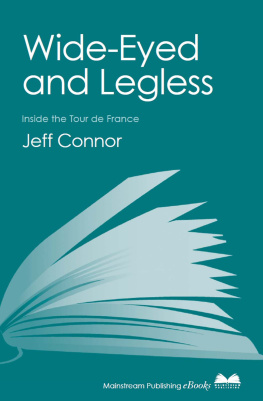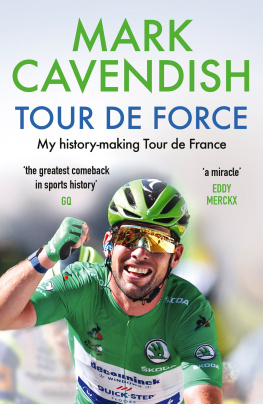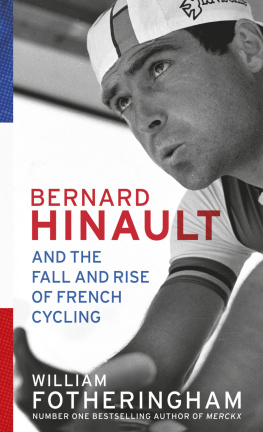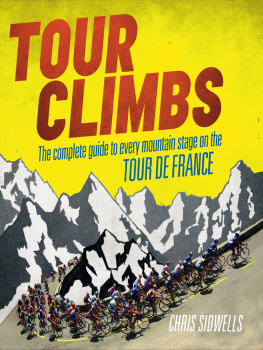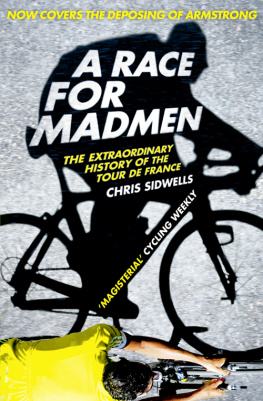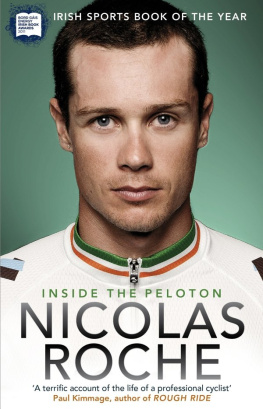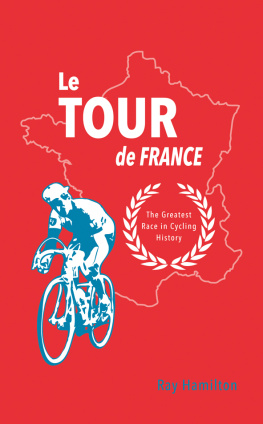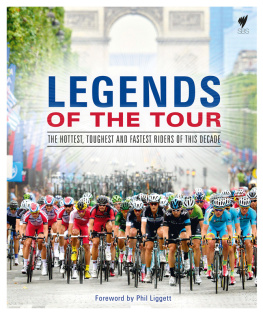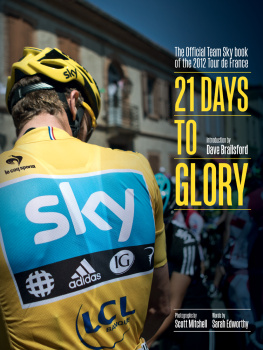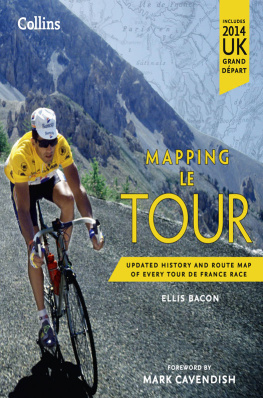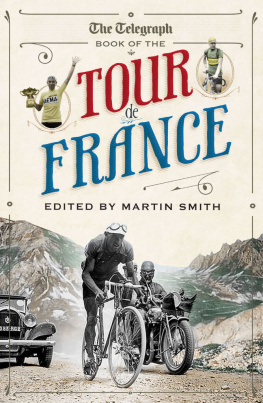About the Author
Jeff Connor was born in Manchester and now lives in Edinburgh. A freelance sportswriter, he has written 12 books, including the definitive story of the Busby Babes, The Lost Babes, and Up and Down Under, an account of the 2001 British Lions tour.
WIDE-EYED AND LEGLESS
INSIDE THE TOUR DE FRANCE
Jeff Connor
This eBook is copyright material and must not be copied, reproduced, transferred, distributed, leased, licenced or publicly performed or used in any way except as specifically permitted in writing by the publishers, as allowed under the termsand conditions under which it was purchased or as strictly permitted by applicable copyright law. Any unauthorised distribution or use of this text may be a direct infringement of the authors and publishers rights and those responsible may be liable in law accordingly.
Epub ISBN: 9781845968014
Version 1.0
www.mainstreampublishing.com
This edition, 2011
Copyright Jeff Connor, 1988
All rights reserved
The moral right of the author has been asserted
First published in Great Britain by Simon & Schuster Ltd in 1988
This edition published in Great Britain in 2011 by
MAINSTREAM PUBLISHING COMPANY
(EDINBURGH) LTD
7 Albany Street
Edinburgh EH1 3UG
ISBN 9781845961718
No part of this book may be reproduced or transmitted in any form or by any other means without permission in writing from the publisher, except by a reviewer who wishes to quote brief passages in connection with a review written for insertion in a magazine, newspaper or broadcast
A catalogue record for this book is available from the British Library
1 3 5 7 9 10 8 6 4 2
ACKNOWLEDGEMENTS
SINCERE THANKS GO TO THE team and personnel of ANC-Halfords for their remarkable patience with and understanding of a cycling civilian and to the other riders of the professional cycling fraternity the greatest and bravest athletes in sport.
I would also like to offer appreciation to Phil Liggett of Channel 4 television for taking time from his busy schedule while in France to offer help and advice, and to Des Cahill of Radio Telefis Eireann for some memorable shared experiences on Tour.
Thanks go to Phil Griffiths, Phil OConnor and Geoff Shergold for the photographs.
Finally, like the Tour de France, this book was a team effort and could not have been possible without the help of my wife Kath and my mother, Mrs Nancy Connor.
CONTENTS
CHAPTER 1
LES ANGLAIS
CYCLIST STEPHEN ROCHE RETURNED FROM the Continent to his Dundrum home on the outskirts of his native Dublin in June 1987 mentally and physically drained. He had just won the Giro dItalia the first part of cyclings great triumvirate which also includes the Tour de France and the World Championships in the same season under the sort of circumstances that would have tried a saint.
In Italy he had been punched, spat upon and slandered by rabid Italian crowds. On some of the mountain stages they had held out slabs of red, raw meat at the roadside, indicating in their partisan way the fate they were wishing on Roche. An even more rabid Italian press railed daily at the little foreigner, and the management and most of his team mates on the Italian Carrera team had disowned him.
The catalyst for all this bile was the rivalry between Roche and his Carrera co-leader, the home favourite and defending champion, Roberto Visentini. Both Roche and the Italian believed they should win the Giro Roche because he knew he was the better rider and Visentini because he was Italian and it was Italys Tour.
When Roche ultimately took the pink jersey of race leader from Visentini against the orders of the Carrera management and held on to it through the last week of the 2,500-mile race it was safe to say that Roche was for a time the most-hated man in Italy.
To hang on to win under these circumstances indicated mental and physical fortitude of the highest order and many began to look to the 27-year-old Irishman to join cycling legends Fausto Coppi, Eddy Merckx, Jacques Anquetil and Bernard Hinault in the history books as men who have won the Giro and the Tour de France in the same year.
Roche himself wasnt so sure. On the Saturday night that the Giro ended he by-passed the Carrera celebration party and drove back to Paris wondering how much the efforts in Italy had taken out of him.
He had already determined that he wouldnt race before the Tour de France. Instead, while the press hunted for him, Roche slipped home to Ireland for a while before beginning his preparations for his tilt at cyclings greatest prize.
For Roche this meant relaxing, and the single-minded Dubliner had his own ideas on how to relax... pulling on a mechanics overalls and tinkering with an old MG in his garage. He had 18 days before the Tours prologue time trial in West Berlin.
While Roche whiled away his time deep in engine oil and axle grease, a 43-year-old millionaire businessman called Tony Capper was waiting anxiously in his Isle of Man home to hear if he, too, would be on the start line in Berlin. Capper, along with transport and haulage firm Associated Nationwide Couriers and the bicycle retailers Halfords, represented, as ANC-Halfords, the first British team challenge on the Tour in 20 years. They had paid their entry fee of 25,000, although the sponsorship costs of the full season, including the wages of staff, riders, transport and machinery, came closer to 600,000, and were now awaiting the final decision from the Socit du Tour de France.
Capper, at first sight, looks an unlikely figure to be involved in sport. At 20 stone plus, a dedicated chain smoker and in his own words not wearing very well, Capper is a rough diamond who made his fortune when he founded and then sold out ANC.
Born and brought up the son of a miner in Stoke-on-Trent, Capper had had a chequered and mystery-shrouded career, joining the Army at sixteen, leaving six years later to become what he described as a very tolerant policeman and later running a taxi business in Stoke.
I had eight years in the police force, he says. But rather than report someone for an offence Id spend an hour bending their ear and convincing them what they were doing was wrong. If you can illustrate things to people its easier to convince them. I used to actually enjoy this and perhaps Id rather let them off than nick them. There were that many people around doing things wrong anyway that you could miss twenty-five of them by trying to catch one.
But I admit I went off my beat. I stood there and said, yes, what I did was wrong. You should be on one side of the street or the other and if you cross to the other side of the street youre in the wrong.
Capper left the police force with two months pay and a car, but his first taxi business ended in disaster.
It ended up as a very sad tale really because I got involved with another guy who lived next door to me and we ended up splitting up. He was a bit too young and inexperienced and he committed suicide.
Capper founded ANC as an overnight express delivery service in 1981. At one time in the companys early days Capper admits that he had liabilities of around 200,000, but one thing you could say about Capper is that he never panics. In five years he built the business into a profitable enterprise until British and Commonwealth Shipping bought him out in 1986. Capper, however, didnt let go completely.

